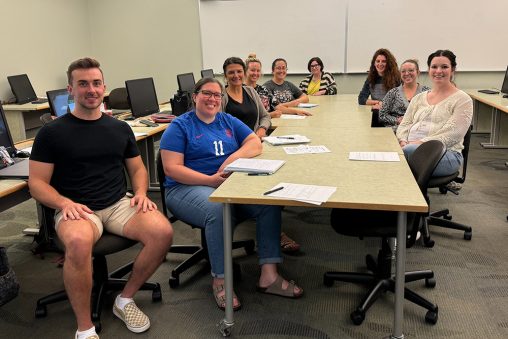
Local high school teachers took English classes at Wright State this summer to earn the credentials needed to teach College Credit Plus courses.
Montgomery County teachers morphed into students this summer at Wright State University to better equip themselves when standing in the front of their high school classrooms as school resumed this year.
This temporary role reversal was a product of a collaboration between Wright State, the Montgomery County Educational Service Center and Learn to Earn Dayton as part of a $230,364 award from the Ohio Department of Education and Workforce to empower local educators and enhance educational opportunities for students across the Dayton region.
The initiative will enable more area teachers to earn credentials to teach College Credit Plus (CCP) courses, which allow high school students to earn college credit. The state award helped cover the cost of tuition, textbooks and other materials to support teachers who want to complete 18 college credit hours of college courses, enabling them to offer college-level classes to their students.
“It was different being a student again,” said Austin Litteral, an English teacher at Kettering Fairmont High School. “It was a nice change of pace that has allowed me to put myself in my students’ shoes a bit.”
As a fourth-year teacher, Litteral said he was able to make more direct connections from the content covered in the Wright State courses than in his pre-service teacher courses since he has a few years of classroom experience under his belt.
“This program not only prepares me to both adapt and teach CCP English courses in the high school setting but also gives me a greater insight on what students can expect in their introductory writing courses their first year of college,” he said. “My students will benefit because I now have a more solid understanding of what their writing instructors will expect of them in their general education composition courses.”
The English program in Wright State’s School of Humanities and Cultural Studies was one of several programs selected to provide graduate instruction to Montgomery County high school teachers as part of this credentialing certificate.

Crystal Lake, professor of English at Wright State, said she benefited as much as her students from teaching a course in the College Credit Plus credentialing program.
The initiative started with two English classes, Teaching College Composition, taught by Crystal Lake, Ph.D., professor of English, and Practical Research in English Language Arts, taught by Angie Beumer-Johnson, Ph.D., professor of English.
“I recognized immediately that this grant opportunity would give Wright State a chance to not only introduce our programs to high school students but also to work closely with their teachers,” said Lake. “In short, the grant helps to strengthen our relationships with both prospective students and our communities.”
Lake worked with eight teachers in a one-week intensive workshop from 9 a.m. to 5 p.m. each day and said they made for excellent students because of the unique experiences they have teaching writing and reading.
“They all had excellent insights, and in fact, I’ve already started incorporating some of their ideas into my own classroom,” said Lake.
Wright State’s English program will continue training high school teachers during the fall 2024 and spring 2025 semesters. The history program hopes to offer CCP classes in the fall and spring as well, said Alpana Sharma, Ph.D., chair of the School of Humanities and Cultural Studies.
During the fall semester, Lake will teach an online asynchronous course that aims to convey all the information students would have received in a 15-week semester for the best practices for teaching English at the college level, in half the time.
Lake said she is lucky to be part of the program because of the glimpses it has given her into Montgomery County high school classrooms, which in turn, has helped improve her own teaching. Furthermore, she has learned best practices from teachers in making their classrooms “exciting and productive spaces in which their students can learn and thrive.”
“Our high school educators here in Raider Country are doing amazing things in their classrooms, and it’s been a truly invigorating experience to see firsthand all the effort, thought and skill they’re putting into the work they’re doing, which benefits us all,” said Lake. “We’re lucky to have these educators working with us at Wright State, and we’ll be just as lucky to get a chance to work with their students one day, too.”

 Walking through open doors
Walking through open doors  Adventures await
Adventures await  Wright State to expand nursing facilities to meet workforce needs and prepare more graduates for in-demand careers
Wright State to expand nursing facilities to meet workforce needs and prepare more graduates for in-demand careers  Wright State student-athletes make a lasting impact on local family with more to come
Wright State student-athletes make a lasting impact on local family with more to come  Wright State names Rajneesh Suri dean of Raj Soin College of Business
Wright State names Rajneesh Suri dean of Raj Soin College of Business 